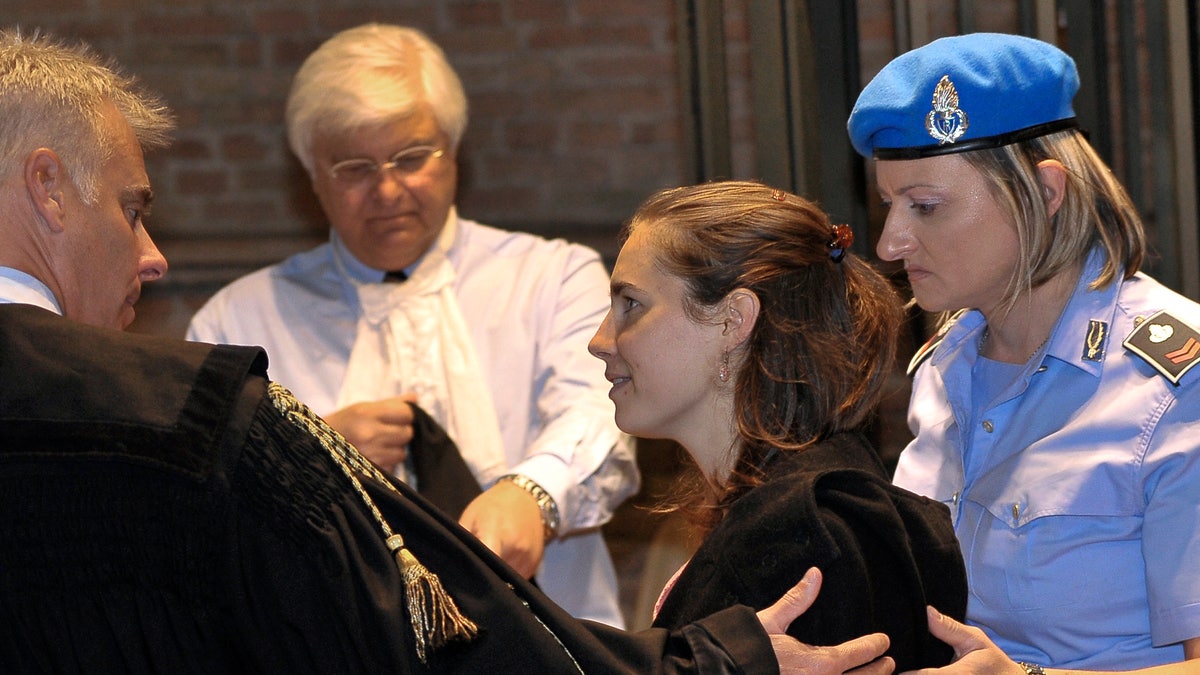
September 27: Amanda Knox, the american student convicted of killing her British roomate, arrives at the Perugia court in Italy. (AP)
PERUGIA, Italy – A defense lawyer told an Italian court Tuesday that Amanda Knox, the American student convicted of killing her roommate, isn't a manipulating, sex-obsessed "femme fatale" as her accusers charge, but is rather like Jessica Rabbit -- just drawn that way.
In closing arguments before an appeals court, lawyer Giulia Bongiorno compared Knox to the cartoon character, contending that Knox had been unfairly portrayed over the course of the media-hyped, four-year case. She said the 24-year-old American is instead a loving young woman who simply displayed immaturity and naivete at the time of the 2007 slaying.
Knox was convicted of sexually assaulting and murdering Meredith Kercher, a British student in Perugia, and sentenced to 26 years in prison. Co-defendant Raffaele Sollecito, an Italian who was Knox's boyfriend at the time of the crime, was convicted of the same charges and sentenced to 25 years.
They both deny wrongdoing and have appealed their 2009 convictions. A verdict in the appeals case is expected in early October.
On Tuesday, Bongiorno likened Knox to the voluptuous character in the "Who Framed Roger Rabbit" film.
"Jessica Rabbit looks like a man-eater, but she is a faithful and loving woman," Bongiorno said. Paraphrasing a famous line from the movie, Bongiorno said Knox "is not bad, she's just drawn that way."
Bongiorno is Sollecito's lawyer, but, with the fates of the two defendants intertwined, she discussed Knox's role in the case at length.
By the media as well as in court, Knox has either been described either as a manipulative "she-devil" or as an innocent girl caught in a judicial inferno in a foreign land. Bongiorno said she was really an immature girl who had just started dating Sollecito.
"One should not mistake tenderness for sexual obsession," Bongiorno said, adding the two liked making faces at each other.
"How do you reconcile that with the 'Venus in Furs' image?" -- another reference Bongiorno threw in to a literary character who enslaved her lover. Bongiorno told reporters after the session that she had given a copy of the book -- a 19th-century Austrian novella -- to Knox, who reads avidly in prison, according to her family and supporters.
Kercher, 21, was stabbed to death in the apartment she shared with Knox, in what prosecutors say had begun like a sexual assault.
Knox and Sollecito insist they spent the night at his house the night of the murder, watching a movie, smoking pot and having sex. The movie they said they were watching, "Amelie," led Bongiorno in the original trial to compare Knox to the title character, an innocent girl intent on doing good.
Bongiorno also looked at DNA evidence linking her client to the crime, most notably an alleged trace on the bra clasp of the victim.
Prosecutors maintain that Sollecito's DNA was on the clasp of Kercher's bra as part of a mix of evidence that also included the victim's genetic profile. They also say Knox's DNA was found on the handle of a kitchen knife believed to be the murder weapon, and Kercher's DNA was found on the blade.
A court-ordered review of evidence, carried out by independent experts, said much of that evidence was unreliable. It highlighted the risk of contamination, especially on the clasp, which was collected from the crime scene 46 days after the murder.
The review significantly weakened the prosecution case, giving the defendants hope that they might be freed after four years behind bars.
Speaking of the clasp, Bongiorno said "that piece of evidence must be considered unusable."
Also convicted in separate proceedings was Rudy Hermann Guede from Ivory Coast. Italy's highest criminal court has upheld Guede's conviction and his 16-year prison sentence. Guede also denies wrongdoing.
